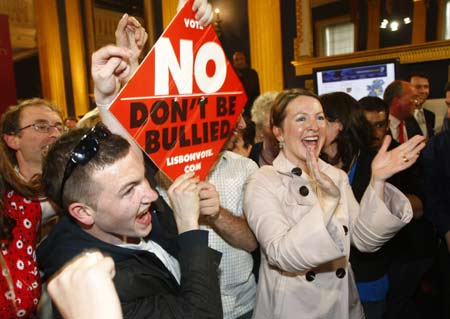Irish voters on Friday rejected the hard-negotiated Lisbon Treaty designed to reform the expanded European Union, plunging the 27-nation bloc into a state of uncertainty.

Irish celebrate as voters rejected Lisbon Treaty on the European Union reform on June 13, 2008. (Xinhua/Reuters Photo)
Official results show that 53.4 percent of voters voted against the treaty designed to streamline the EU institutions with high levels of efficiency and a more unified voice in decision making.
Ireland is the only country among the 27 EU member states that holds a referendum on the reform treaty as required by the country's constitution. Its "No" vote has left both the 18 countries which have already ratified the treaty and the others in the process of ratification into a real dilemma.
Ireland's "No" vote also means that the country's 3 million or so registered voters who account for only 1 percent of the EU population have thrown the 500 million EU citizens into the embarrassment of an unknown future.
European Commission President Jose Manuel Barroso had said before the Irish referendum that a "No" vote would get all EU countries including Ireland to "pay a price," and there would be "no plan B."
After the public vote on Friday, he reiterated that the treaty is not "dead", and the Irish "No" vote should not be seen as "voting against the European Union".
EU states "should continue to ratify the treaty despite the Irish result," he said.